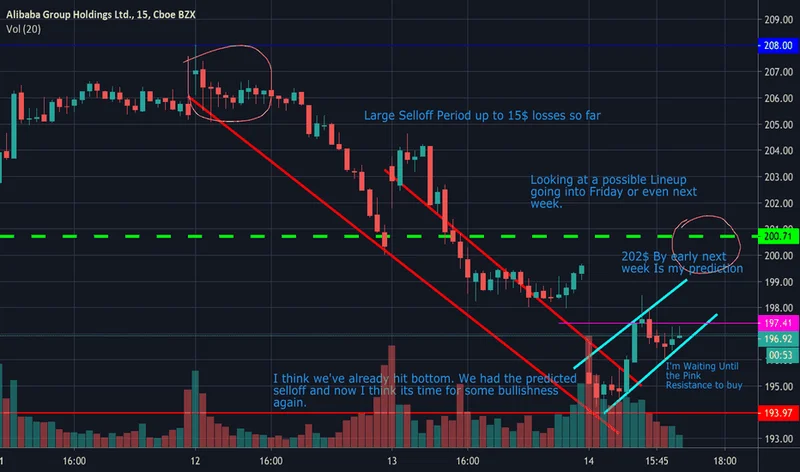360° Financial Trend Detection
360° Financial Trend Detection
Alright, folks, buckle up! Because what's happening with Alibaba (BABA) right now isn't just about stock prices—it's about a fundamental shift in how China is approaching the AI revolution, and frankly, how the world should be. We're talking about a company not just adapting, but leading a paradigm shift. And honestly, it's the kind of story that makes me remember why I got into this field in the first place.
The headlines are buzzing with conflicting narratives. One minute, Alibaba's shares are dipping because of alleged ties to the Chinese military—a claim the company vehemently denies, by the way. Alibaba dips after White House memo claims it's helping Chinese military target US: report (BABA:NYSE). The next, analysts are downgrading the stock despite Wall Street's overall bullishness. You see headlines that scream about earnings pressure and market selloffs, and it's easy to get caught up in the short-term noise. But that's exactly what the bears want you to do.
What they're missing is the forest for the trees. Alibaba isn't just another e-commerce giant; it's rapidly transforming into an AI-driven powerhouse. And the way it's doing it is uniquely brilliant.
See, the West, particularly the U.S., is obsessed with Large Language Models (LLMs)—massive, power-hungry AI systems that require enormous computing resources. Think of it like trying to solve every problem with a sledgehammer. China, facing export controls and energy constraints, is taking a different approach: Smaller Language Models (SLMs) optimized for specific tasks. It's like having a set of precision tools instead of just one oversized hammer.
This isn't a limitation, it's a strategic advantage. By focusing on efficiency and real-world applications, Alibaba is building a more sustainable and scalable AI ecosystem. They're leveraging open-source development to accelerate innovation and reduce their dependence on cutting-edge Nvidia hardware (NVDA), which, let's be honest, is becoming a geopolitical football. Alibaba is partnering with domestic chip projects, using locally produced AI chips to deliver impressive compute power.
This approach is incredibly smart, and it’s also more accessible. It’s not about who has the biggest, most expensive AI; it’s about who can create the most useful and practical AI solutions for everyday problems. Imagine a world where AI isn't just for tech giants, but for everyone.

Now, think about the implications of this. The Chinese government is even subsidizing energy costs for large data centers, effectively widening Alibaba's margin buffer and incentivizing the development of energy-efficient AI models. This is a game-changer, folks. It means Alibaba can scale its AI operations more cost-effectively, giving it a significant competitive edge.
Analysts are starting to take notice. One report highlights Alibaba's Cloud Intelligence Group as the central profit engine of the company. Management has committed over $50 billion toward global data-center expansion and power-efficient infrastructure. While overall revenue growth may seem modest, the profitability of Alibaba's cloud business is soaring, driven by the increasing adoption of AI-powered services.
What does this mean for us? It means that Alibaba is poised to become a leader in the next wave of AI innovation. It's not just about competing with Amazon (AMZN) or Tesla (TSLA); it's about creating a whole new paradigm for how AI is developed and deployed.
Of course, there are risks. Geopolitical tensions and competition from other players like Meituan are always a concern. But the potential rewards far outweigh the risks. And as much as I believe in technological advancement, it's important to consider the ethical implications of AI. We must ensure that these technologies are used for good and that we address any potential biases or negative consequences. It’s our collective responsibility.
I saw a comment on Reddit the other day that really resonated with me: "Alibaba is playing chess while everyone else is playing checkers." It’s a perfect analogy. They’re thinking long-term, strategically positioning themselves to capitalize on the AI revolution.
The bears are focused on the short-term headwinds, but they're missing the biggest picture: Alibaba is building the future of AI, one energy-efficient, task-oriented model at a time. This isn't just about BABA stock price today; it's about a fundamental shift in the global AI landscape. And I, for one, am incredibly excited to see what happens next.